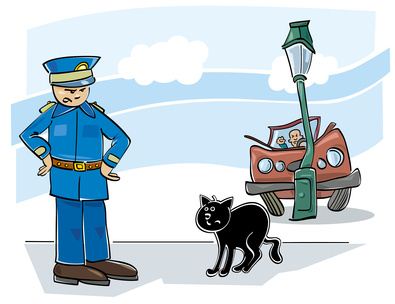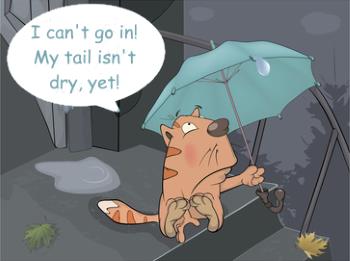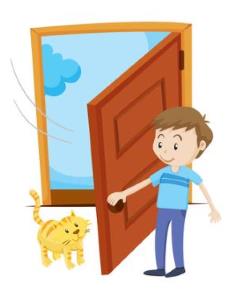It’s 2016. Does it even make sense to ask whether you should have an indoor or an outdoor cat? The view that most, if not all, cats should live in the safety of indoors as opposed to going outside freely is not only widespread; it is often considered weird or inhumane to think otherwise.
But the question still makes sense, and we’ll explain why in this article. We are also going to tackle the questions of whether indoor cats live longer or are healthier. And, on a more philosophical note, aren’t they missing the excitement of the great outside?
Should you keep your cat inside or let it outside?
Before presenting arguments, we are going to dive into the main question. Should you let your cat go outside, or should you keep the doors locked? Disappointment might arise from knowing that we are not going to give the ultimate answer.

We do not agree with the widespread belief that all cats should be kept exclusively indoors. And we are not saying: “Of course, not ALL cats!” We are sure that many of our readers could consider letting their cats out to some extent.
However, you should ask yourself several questions: Does your area outdoors provide anything beneficial to your cat? Is there green grass, fresh air, or open space? Or is it a concrete jungle filled with fumes?
Also, does your cat have the skills to survive outside? If they have lived indoors for most of their lives, it might be better to keep it that way, even if you just moved to a rural area. Additionally, some cats are slightly slower than others, less vigorous and athletic, or, not to offend anyone, less intelligent. These cats are more suited to the indoor lifestyle as companion animals. We are also talking about certain cat breeds that are further evolved from their wild ancestors.
The safety of keeping a cat indoors
 Safety is the most common reason that pet owners keep their cats indoors. There is no doubt, they are right. Saying that most accidents happen at home does not apply to cats, apparently.
Safety is the most common reason that pet owners keep their cats indoors. There is no doubt, they are right. Saying that most accidents happen at home does not apply to cats, apparently.
Traffic accidents; attacks by dogs, foxes, or mean people; or injuries from cat fights are just a few of the bad things that can happen to outdoor cats.
A general rule is that the more urban the environment, the riskier it becomes. More cars driving past mean more opportunities for your cat to get hit while crossing the road.
If you are concerned about your cat’s safety and longevity, that alone is a good enough reason to keep your cat indoors.
How does being outside affect your cat’s health?
Besides being safe from accidents, which are a health hazard on their own, indoor cats are less exposed to infectious diseases and parasites.
Keep in mind that indoor cats are not completely immune, not even close. Worm eggs and viruses find creative ways of getting inside, meaning that both indoor and outdoor cats must be vaccinated and must receive parasite medicine appropriately.
Indoor cat owners tend to notice their pet’s health problems earlier, which increases the likelihood of successful treatment. This happens because indoor cats live in closer contact with their owners. They cuddle and get petted more often, and their owners notice changes in eating, drinking, and toileting habits much earlier.
Indoor cat owners also have complete control over their cat’s diet, which is good in most cases. Not only can you prevent your cat from hunting or scavenging, but you also won’t have a problem with neighbors (usually well intending) giving not so healthy treats to visiting cats.
Activity levels of indoor cats, on the other hand, are significantly lower, which can lead to a series of medical problems, mostly associated with the increased risk of obesity. Cardiovascular disease, diabetes, hepatic lipidosis, and increased stress are problems that are most commonly linked with the sedentary lifestyle of indoor cats. The good news is that there is a lot an owner can do to increase the activity level of their pet.
Are outdoor cats less troublesome?
It is natural for humans to think about themselves, and outdoor cats are often viewed as more self-contained when compared to their indoor counterparts. But are they less needy in terms of maintenance? Well, not really.
The litter box, if there even is one, is less used and therefore requires less scooping. Disruptive behaviors are also more easily solved, true story, by letting the cat out whenever it is causing trouble. Indoor cats, on the other hand, won’t beg in-out-in-out all day and night.
 You should remember that there is no such thing as a “maintenance free” or “low maintenance” cat. Letting a cat out shouldn’t be an answer to your unwillingness to clean the litter box or deal with meowing.
You should remember that there is no such thing as a “maintenance free” or “low maintenance” cat. Letting a cat out shouldn’t be an answer to your unwillingness to clean the litter box or deal with meowing.
Besides, if you have an indoor cat, your house will be much, much cleaner. You won’t mind your cat having a dream on white pillows or sitting on your lap. The worst happens if the weather is bad and your outdoor cat comes in wet and muddy.
A huge inconvenience for outdoor cat owners is frequently having to worry about the cat not coming home at the usual time. Even 30 minutes late can be troubling if you consider yourself a pet parent. Even if your cat is all right, he or she won’t phone to tell you that.
Quality of life of indoor and outdoor cats
Cats are mainly companion animals these days, and caring about their wellbeing is not only a fashion. It’s a logical consequence if we consider them part of our family.
At this point inevitably comes the question, do cats enjoy their life without going outside? Do they ever! It’s safer, yes, but many of us, just saying, refer to our pets as our babies. If we take this analogy seriously, then, comparably, locking up a teenager could get you a free pass to jail, even if your main intention is to save him from drugs, muggers, and extreme sports.
It is a basic human right to live without confinement, but what about the rights of cats? Firstly, cats are not humans. We don’t say that human rights don’t apply to them; we say that we can’t draw a parallel line when portraying their emotions.
We can theorize, though this does not make it true, that cats do not long for what they have long since forgotten, for example, being outdoors. But don’t they? The truth is, we cannot tell for sure. One thing though, if your cat receives enough playtime from you and he isn’t meowing at the door, he likely isn’t missing outside.
Basic animal rights, such as freedom from hunger and pain and the ability to express natural behaviors, do apply to cats. Keeping a cat indoors shouldn’t be limited to locking the front door. Confinement is confinement, no matter what, and you must put in the effort to make it bearable. How?
Enrich your cat’s environment. Does your home provide enough opportunities for your cat to climb? Does he receive enough playtime? Are there enough scratching surfaces, water locations, safe plants to nibble, and things to observe? You can learn more about environment enrichment for indoor cats here. It is not just good for cats, it is absolutely necessary for them to keep sane if they never get outside.
Behavior problems of indoor and outdoor cats
It is possible to provide a wholesome life to an indoor cat, though, honestly, many people do not. And that’s when bad behavior emerges.
 No doubt the outdoors provide a greater territory, more opportunities to express natural behavior, and a more active lifestyle. Simply put, being outside requires constant awareness, and it is very hard to get bored there.
No doubt the outdoors provide a greater territory, more opportunities to express natural behavior, and a more active lifestyle. Simply put, being outside requires constant awareness, and it is very hard to get bored there.
Boredom and lack of attention are common causes for several behavior problems of indoor cats, such as constant meowing, food stealing, knocking objects from surfaces, and others. In theory.
However, indoor cats do not behave worse in reality. Several statistical studies have failed to show that indoor cats exhibit more bad behavior than outdoor cats.
Maybe this is because indoor cat owners are more willing to solve problems as they appear, whereas outdoor cat owners find that it is less effort to cope than to work to solve the problem.
Whatever the reason, the consensus is that, if an indoor cat gets adequate stimulation, you can expect no more behavior problems than you would get from an outdoor cat.
Do outdoor cats threaten wildlife?
There is no doubt that cats do hunt. And they hunt a lot. Estimates state that more birds are killed by cats than by crashing into home and car windows combined. Mammals, such as rats and mice, are slaughtered in even greater numbers, though very few people are concerned about that part.
Some might wonder if it is a problem at all since hunting is natural. You know, predator eats prey, natural selection at work, and all that stuff. However, this isn’t true!
House cats hunting wild birds is not natural. Natural selection works in a natural environment, but house cats that are well fed, rested, and receiving regular veterinary care are unnaturally fit in terms of natural selection. They’re like video game characters who get to restore strength whenever returning to “base” (cats don’t have nine lives, at least), whereas birds do not enjoy that luxury.
But is keeping your cat inside the answer? No one knows for sure, because ecosystems are complex and do not work similarly across the globe. Several studies in Australia, where some areas have implemented strict rules for keeping cats in or out, show that this has very little impact on wild bird populations.
There are areas in the world where the introduction of cats has driven certain bird species to extinction, but there are also areas where some bird species have been saved because cats feast on their natural predators.
To say more than that means entering into philosophy. Who are we to say whether you should save cats by feeding them farmed chicken meat or save chickens by making your cat vegan.
The thing is, cats do hunt, and they hunt at unnatural levels in urban environments. But their real impact on wildlife species is debatable. At the same time, many of us do find dead prey at their door, regardless of wildlife species impact. You can learn to prevent your outdoor cat from bringing prey home here.
Should you keep your cat indoors?
 After all of this long rant, is it clear to you whether you should keep your cat inside or let him out from time to time? There is no definite answer, however…
After all of this long rant, is it clear to you whether you should keep your cat inside or let him out from time to time? There is no definite answer, however…
The vast majority of cats in urban areas will be better off living exclusively indoors. If you agree, learn how to transition your cat to indoors here.
This does not mean you should not weigh your options just because everyone else thinks that all cats must live inside.
There are many things that might matter to you, such as how you interact with the cat, how much time you are willing to invest in your cat’s wellbeing and can you provide enjoyable indoor life to your pet.
The most important factor, however, is the safety of your cat. The risks of going outside, even though you can minimize some of them, increase and the benefits decrease with the density of your area. Do you think your neighborhood is at least remotely suitable for an outdoor cat? That is what you should ask yourself.
